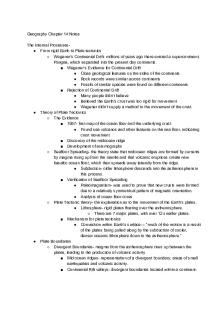Chapter 14 Notes - Groupthink PDF

| Title | Chapter 14 Notes - Groupthink |
|---|---|
| Course | Communication Theory |
| Institution | Sam Houston State University |
| Pages | 3 |
| File Size | 78.1 KB |
| File Type | |
| Total Downloads | 65 |
| Total Views | 182 |
Summary
Chapter 14 Notes - Groupthink...
Description
Chapter 14 Notes Groupthink Based on the research of Irving Janis. A push for unity. Don’t affectively view alternatives. Groupthink - a way of group deliberation that minimizes conflict and emphasizes the need for unanimity
Assumptions of Groupthink • Conditions in groups promote high cohesiveness. • Group problem solving is primarily a unified process. • Groups and group decision making are frequently complex. Problem-solving groups - sets of individuals whose main task is to make decisions and provide policy recommendation task-oriented groups - sets of individuals whose main goal is to work toward completing jobs assigned to them cohesiveness - a cultural value that places emphasis on the group over the individual affiliative constraints - when members withhold their input rather than face rejection from the group homogeneity - group similarity. Groups where members are similar to one another.
What Comes Before: Antecedent Conditions of Groupthink Janis believes that three conditions promote groupthink: (1) high cohesiveness of the decisionmaking group, (2) specific structural characteristics of the environment in which the group functions, and (3) stressful internal and external characteristics of the situation. group insulation - a group’s ability to remain unaffected by outside influences lack of impartial leadership - groups led by individuals who put their personal agendas first lack of decision-making procedures - failure to provide norms for solving group issues
internal and external stress - pressure exerted on the group by issues and events both inside and outside of the group
Symptoms of Groupthink concurrence seeking - efforts to search out group consensus Overestimation of the Group overestimation of the group - erroneous belief that the group is more than it is illusion of invulnerability - belief that the group is special enough to overcome obstacles belief in the inherent morality of the group - assumption that the group members are thoughtful and good; therefore, the decisions they make will be good Closed-Mindedness closed-mindedness - a group’s willingness to ignore differences in people and warnings about poor group decisions out-group stereotypes - stereotyped perceptions of group enemies or competitors collective rationalization - situation in which group members ignore warnings about their decisions Pressures Toward Uniformity pressure toward uniformity - occurs when group members go along to get along self-censorship - group members minimize personal doubts and counterarguments illusion of unanimity - belief that silence equals agreement self-appointed mindguards - individuals who protect the group from adverse information pressures on dissenters - direct influence on group members who provide thoughts contrary to the group’s
Think Before You Act: Ways to Prevent Groupthink whistle-blowing - process in which individuals report unethical or illegal behaviors or practices to others. People that speak up.
conscientious objectors - group members who refuse to participate because it would violate personal conscience
Integration, Critique, and Closing Communication Tradition – Socio-Psychological & Socio-Cultural Communication Context – Small Group & Organizational Approach to Knowing – Positivistic/Empirical Critique – Scope, Testability, Heurism, Test of Time...
Similar Free PDFs

Chapter 14 Notes - Groupthink
- 3 Pages

Chapter 14 - Lecture notes 14
- 5 Pages

Groupthink Theory
- 2 Pages

Geography Chapter 14 Notes
- 5 Pages

Social groupthink essay
- 8 Pages

Chapter 14 Nutrition Notes
- 12 Pages

Chapter 14 - class notes
- 4 Pages

Chapter 14 - 2020 notes
- 4 Pages

Health Chapter 14 Notes
- 1 Pages

Chapter 14 Eyes Notes
- 11 Pages

Textbook Notes Chapter 14
- 1 Pages

LAW1121 - Notes Chapter 14
- 2 Pages

Chapter 14 class notes
- 15 Pages

Chapter 14 - notes
- 16 Pages

Chapter 14 Notes
- 1 Pages

MK323 Chapter 14 Notes
- 4 Pages
Popular Institutions
- Tinajero National High School - Annex
- Politeknik Caltex Riau
- Yokohama City University
- SGT University
- University of Al-Qadisiyah
- Divine Word College of Vigan
- Techniek College Rotterdam
- Universidade de Santiago
- Universiti Teknologi MARA Cawangan Johor Kampus Pasir Gudang
- Poltekkes Kemenkes Yogyakarta
- Baguio City National High School
- Colegio san marcos
- preparatoria uno
- Centro de Bachillerato Tecnológico Industrial y de Servicios No. 107
- Dalian Maritime University
- Quang Trung Secondary School
- Colegio Tecnológico en Informática
- Corporación Regional de Educación Superior
- Grupo CEDVA
- Dar Al Uloom University
- Centro de Estudios Preuniversitarios de la Universidad Nacional de Ingeniería
- 上智大学
- Aakash International School, Nuna Majara
- San Felipe Neri Catholic School
- Kang Chiao International School - New Taipei City
- Misamis Occidental National High School
- Institución Educativa Escuela Normal Juan Ladrilleros
- Kolehiyo ng Pantukan
- Batanes State College
- Instituto Continental
- Sekolah Menengah Kejuruan Kesehatan Kaltara (Tarakan)
- Colegio de La Inmaculada Concepcion - Cebu